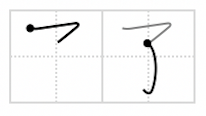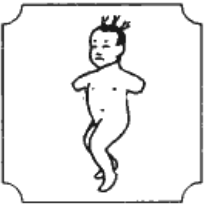Free

- 237 lessons
- 0 quizzes
- 99999 week duration
-
Previous Levels
-
Level 129
-
Level 130
-
Level 131
-
Level 132
-
Level 133
-
Level 134
-
Level 135
-
Level 136
-
Level 137
-
Level 138
-
Level 139
-
Level 140
-
Level 141
-
Level 142
-
Level 143
-
Level 144
-
Level 145
-
Level 146
-
Level 147
-
Level 148
-
Level 149
-
Level 150
-
Level 151
-
Level 152
-
Level 153
-
Level 154
-
Level 155
-
Level 156
-
Level 157
-
Level 158
-
Level 159
-
Level 160
-
Level 161
-
Level 162
-
Level 163
-
Level 164
-
Level 165
-
Level 166
-
Level 167
-
Level 168
-
Level 169
-
Level 170
-
Level 171
-
Level 172
-
Level 173
-
Level 174
-
Level 175
N2 Kanji 6: 了
Meaning:

In Japanese, 了 means “over”.
How to read it:
| Kunyomi | Not often used |
| Onyomi | りょう |
How to write it:

Origin:

You can see a baby who doesn’t have arms, long time ago, people thought if a baby doesn’t have arms, his or her life is over.
So 了 means “over”.

Development:

Vocabulary:
| Level | Word | Reading | Meaning |
|---|---|---|---|
| Inter | 終了 | しゅうりょう | end |
| Inter | 了解 | りょうかい | understand |
| Inter | 完了 | かんりょう | complete |
| Adv | 了承 | りょうしょう | understand |
| H_Adv | 魅了 | みりょう | fascination |
| H_Adv | 修了 | しゅうりょう | to obtain |
| S_Adv | 満了 | まんりょう | expiration |
| Others | 了見 | りょうけん | intention |
| Others | 未了 | みりょう | unfinished |
| Others | 読了 | どくりょう | finished reading |
| Others | 結了 | けつりょう | completion |
| Others | 了知 | りょうち | knowing |
| Others | 校了 | こうりょう | final proofreading |
| Others | 議了 | ぎりょう | finishing discussion |
Prev
N2 Kanji 5: 乾
Next
N2 Kanji 7: 介